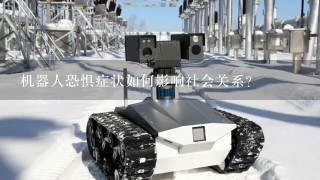机器人恐惧症状如何影响社会关系?

Answer:
Robot anxiety, a fear of robots or artificial intelligence, can have significant implications for society. Here's how it can affect social relationships:
1. Reduced Trust:
- People may hesitate to interact with robots or AI systems, as they may perceive them as dangerous or threatening.
- This can lead to a decrease in social interaction and a sense of isolation.
2. Social Isolation:
- Robot anxiety can prevent people from engaging in social activities that involve interacting with robots, such as attending robot shows or interacting with humanoid robots in public spaces.
- This can lead to social isolation and loneliness.
3. Reduced Social Participation:
- People may avoid social situations where robots or AI are present, as they may feel uncomfortable or intimidated.
- This can result in a decrease in social participation and a loss of social connections.
4. Difficulty in Communication:
- Robot anxiety can make it difficult for people to communicate effectively with robots or AI.
- This can lead to misunderstandings and conflicts.
5. Negative Impact on Social Interactions:
- Robot anxiety can create a hostile environment for social interactions, making it challenging for people to connect and build relationships.
- This can lead to a decline in social cohesion and a sense of community.
6. Impact on Social Norms:
- Robot anxiety can challenge social norms and values that have traditionally been associated with human interaction, such as social etiquette and respect.
- This can lead to a shift in social behaviors and a redefinition of what constitutes appropriate social behavior.
7. Difficulty in Addressing Social Challenges:
- Social challenges, such as loneliness, depression, and anxiety, can be exacerbated by robot anxiety.
- People with social anxiety may find it more challenging to cope with these challenges in a social setting where robots are present.
Conclusion:
Robot anxiety can have profound implications for society, leading to reduced trust, social isolation, reduced social participation, difficulty in communication, negative social interactions, and a challenge in addressing social challenges. It is important to address this issue to create a more inclusive and accessible society where people can interact with robots and AI systems in a safe and respectful manner.































































